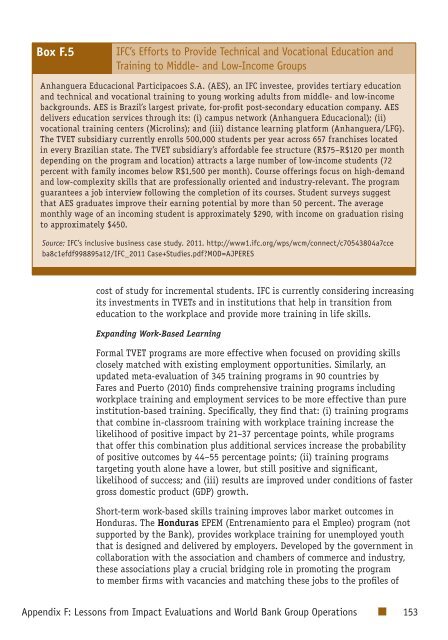Youth Employment Programs - Independent Evaluation Group
Youth Employment Programs - Independent Evaluation Group
Youth Employment Programs - Independent Evaluation Group
Create successful ePaper yourself
Turn your PDF publications into a flip-book with our unique Google optimized e-Paper software.
Box F.5IFC’s Efforts to Provide Technical and Vocational Education andTraining to Middle- and Low-Income <strong>Group</strong>sAnhanguera Educacional Participacoes S.A. (AES), an IFC investee, provides tertiary educationand technical and vocational training to young working adults from middle- and low-incomebackgrounds. AES is Brazil’s largest private, for-profit post-secondary education company. AESdelivers education services through its: (i) campus network (Anhanguera Educacional); (ii)vocational training centers (Microlins); and (iii) distance learning platform (Anhanguera/LFG).The TVET subsidiary currently enrolls 500,000 students per year across 657 franchises locatedin every Brazilian state. The TVET subsidiary’s affordable fee structure (R$75–R$120 per monthdepending on the program and location) attracts a large number of low-income students (72percent with family incomes below R$1,500 per month). Course offerings focus on high-demandand low-complexity skills that are professionally oriented and industry-relevant. The programguarantees a job interview following the completion of its courses. Student surveys suggestthat AES graduates improve their earning potential by more than 50 percent. The averagemonthly wage of an incoming student is approximately $290, with income on graduation risingto approximately $450.Source: IFC’s inclusive business case study. 2011. http://www1.ifc.org/wps/wcm/connect/c70543804a7cceba8c1efdf998895a12/IFC_2011 Case+Studies.pdf?MOD=AJPEREScost of study for incremental students. IFC is currently considering increasingits investments in TVETs and in institutions that help in transition fromeducation to the workplace and provide more training in life skills.Expanding Work-Based LearningFormal TVET programs are more effective when focused on providing skillsclosely matched with existing employment opportunities. Similarly, anupdated meta-evaluation of 345 training programs in 90 countries byFares and Puerto (2010) finds comprehensive training programs includingworkplace training and employment services to be more effective than pureinstitution-based training. Specifically, they find that: (i) training programsthat combine in-classroom training with workplace training increase thelikelihood of positive impact by 21–37 percentage points, while programsthat offer this combination plus additional services increase the probabilityof positive outcomes by 44–55 percentage points; (ii) training programstargeting youth alone have a lower, but still positive and significant,likelihood of success; and (iii) results are improved under conditions of fastergross domestic product (GDP) growth.Short-term work-based skills training improves labor market outcomes inHonduras. The Honduras EPEM (Entrenamiento para el Empleo) program (notsupported by the Bank), provides workplace training for unemployed youththat is designed and delivered by employers. Developed by the government incollaboration with the association and chambers of commerce and industry,these associations play a crucial bridging role in promoting the programto member firms with vacancies and matching these jobs to the profiles ofAppendix F: Lessons from Impact <strong>Evaluation</strong>s and World Bank <strong>Group</strong> Operations 153
















